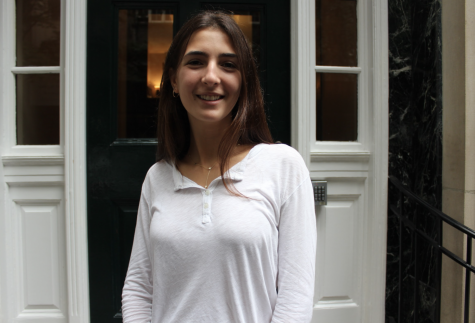Q&A With Dr. Bernstein
Q. As someone who has experience working for other institutions, what are your impressions of Ramaz? How is it better or worse?
A. I taught here in 2010-11. I have also taught at NYU, Rutgers and other colleges. Ramaz, the only grade school I’ve taught at, strikes me as a very serious place. The students are very diligent and committed. Some of the Ramaz students I have taught in the past have gone on to be my students in college– it was very interesting to see them thrive there.
Q. How does your present experience at Ramaz compare to your experience six years ago? Has the school changed?
A. This is hard for me to answer without having been here again for more than a month. Come back and ask me this at the end of the year.
Q. What made you want to be a history teacher? Were you a passionate history student in grade school?
A. I was not a passionate student in grade school, but I did have one or two teachers who were very inspiring. I drew inspiration from them to go into teaching. In fact, those teachers inspired me in two ways: they were dynamic to the point that they could make any topic, no matter how obtuse, come alive, and they took ideas and learning seriously, and evinced this seriousness in how they went about their teaching. They made it clear, in other words, that what they were teaching was immensely important, and their students took the subject seriously in turn.
Q. What was the subject of your dissertation? From where did you receive it?
A. I completed my doctorate at NYU. I received one in US History and one in Jewish history with an emphasis on Zionism. In my dissertation, I examined how Zionists in the United States in the early 20th century viewed America and Palestine. I focused specifically on whether, and why, they saw America as “golus” or “exile.”
Q. What do you consider the most compelling issues confronting world Jewry today?
A. Seems to me that the diaspora-Israel relationship is one of the most, if not the most, pressing issue confronting world Jewry at the present moment.
Q. What is the most memorable lesson you’ve ever taught?
A. Hard to say, but I do think that my teaching at the college level on topics pertaining to the history of Israel, and specifically the Oslo accords, have been the most meaningful for me.
Q. What is the biggest challenge you have ever encountered in teaching, and how did you overcome it?
A. The biggest challenge, for me, has always been to relay difficult and sometimes arcane concepts to students in such a way that they were able to understand them and appreciate how relevant they were in contributing to the development of the modern world. This is a challenge that, I imagine, a teacher never completely figures out. I’m constantly wrestling with the dilemma.
Q. How do you enjoy spending your time outside of Ramaz?
A. I have two little kids, so outside Ramaz I pretty much have no time. I like to cook, read, go to the movies, and go out to eat.
Q. What is your favorite all time film and what are you watching on Netflix right now?
A. My favorite film would have to be There Will Be Blood. My wife and I are currently in the middle of The Marvelous Mrs. Maisel, though, to be sure, this is an Amazon series, not Netflix.
Q. What is your favorite app?
A. I can tell you that my least favorite app is Twitter.
Q. How can a student be successful in your class?
A. That’s easy — be attentive, participatory, and respectful in class; do the readings and take copious notes; give it your all on papers and exams.
Q. What is some advice you can give to your students this year?
A. Keep calm and carry on.

Sophia Kremer started writing for the Rampage as a freshman covering orientation and now serves as Co-Editor-in-Chief. Sophia plans to promote the paper...


